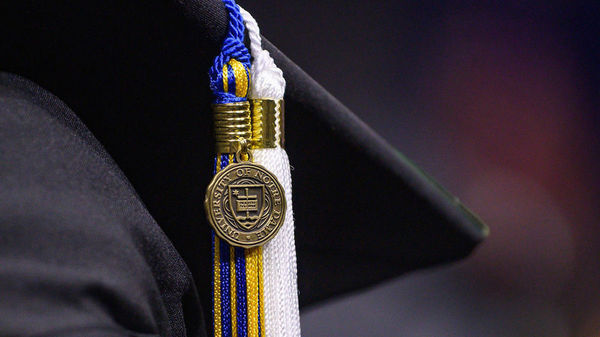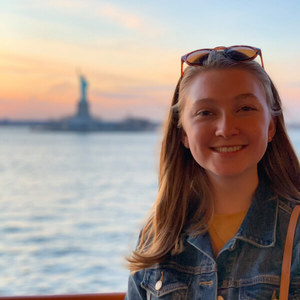
The Nanovic Institute joins the broader Notre Dame community in congratulating the Class of 2021 and the many students who have enjoyed success and recognition during this commencement season. Clemens Sedmak, interim director of the Nanovic Institute and professor of social ethics, notes that “the accompaniment of undergraduate students is part of the core mission of the Nanovic Institute.” In this spirit, the institute welcomes the opportunity to celebrate the achievements of European studies students.
Three students who minored in European studies and another who majored in global affairs with a concentration in transnational European studies have graduated as part of the Class of ’21. These new graduates include Daniel (Danny) Garda (finance major, European studies minor), Megan Smith (economics major, digital marketing and European studies minor), Joseph (Joe) Weas (finance major, European studies minor), and Sophia Pelayo Mazzone (marketing major, supplementary major in global affairs with a concentration in transnational European studies).
Valeria Mora-Hernández, a Nanovic graduate fellow, graduated with a Ph.D. in Spanish from the Department of Romance Languages and Literatures. Dr. Mora-Hernández’s research focuses on representations of violence and marginalization in early modern Spanish literature.
The Nanovic Institute was also delighted to award two special prizes to recognize and support undergraduate research. Joe Weas ’21 was awarded the 2021 Wegs Prize for the best capstone essay by a student in either the minor in European studies or the concentration in transnational European studies. Shea Murphy ’22 has received the R. Stephen and Ruth Barrett Family Grant for Best Undergraduate Travel and Research Proposal to undertake research in Dublin, Ireland.

Weas’ essay, “Financial Speculation, the Decline of the Liberal Party and the Rise of the Labour Party,” considers a question that has divided historians and political scientists for generations: why the British Liberal Party suddenly unraveled in the 1920s. While one side of the debate, the “accidentalist” position, sees the Liberal collapse as collateral damage of the First World War, Weas argues in favor of the opposing “inevitablist” camp, which places the blame on the Liberal Party’s inability to capture some of the newly expanded working-class segment of the electorate. Weas explains that the significance of this political shift in fortunes, which saw the Liberal Party’s representation in Westminster falling from 400 Members of Parliament to 40 in just 18 years, is that “the rise of the Labour Party at the expense of the Liberal Party changed the course of British politics in the twentieth century and led to the two-party system that Britain maintains today.
Mark T. Kettler, a postdoctoral research associate at the Nanovic Institute, directed Weas’ capstone essay and describes it as “a remarkable capstone, offering a cogent intervention in ongoing historical debates well supported by primary sources.” Kettler praises Weas’ diligence and focus during this first foray into historical scholarship, an onerous task that required him to tackle complex secondary scholarship, identify historiographical debates, analyze primary sources, develop new questions and a coherent research agenda, and refine and articulate his findings. That Weas mastered all of these new skills in just five months, according to Kettler, “makes the final product all the more remarkable.”

Murphy, who majors in history, film, television, and theatre with a minor in Irish studies, will use her Barrett Family Grant to conduct research for her project: “The Role of Women in the 20th Century Irish Struggle for Independence: A Study of the Relationship Between the Irish Suffrage Movement and the Involvement of Women in the 1916 Easter Rising.” Murphy says she was “always intrigued by the mention of women’s involvement in the Irish Republican movement, from figures like Constance Markievicz during the revolutionary period to the Price sisters during the Troubles.” She found, however, that other than notable figures, “the larger role of women was largely unreported.” To address this gap, Murphy’s research will consider such questions as how the involvement of women in the Easter Rising and the subsequent republican movement challenged contemporary conceptions of femininity, and how they navigated involvement in both the suffragette movement and the republican movement.
Murphy will conduct her research at the National Archives of Ireland and the National Library of Ireland, both in Dublin. “I hope that looking at the archives,” she says, “will allow me to recover more of the voices of the women involved.” This will involve delving into the General Prisons Board Suffragette Papers, and the extensive Women’s History in Ireland collection at the National Library. This collection includes the personal diaries, letters, and various papers of a number of women who were involved in the suffrage movement, the republican movement, or both, including one of Ireland’s most notable suffragettes and Irish nationalists, Hanna Sheehy Skeffington. This research will be essential for Murphy’s history honors major senior thesis, which she will write under the supervision of Colin Barr, visiting faculty fellow at the Keough-Naughton Institute for Irish Studies. The Nanovic Institute looks forward to hearing more about her findings upon her return.
Sedmak expresses the Nanovic Institute’s pride in its students, noting “it is edifying to see how our students deepen their knowledge of Europe and their expertise in European studies.” He also extends sincere congratulations to Murphy and Weas for their well-deserved awards. “Their accomplishments,” Sedmak says, “show a wonderful combination of intellectual curiosity, persistence in research, and the ability to express ideas. Our students have brought Europe closer to Notre Dame, which is another key aspect of Nanovic’s mission.”